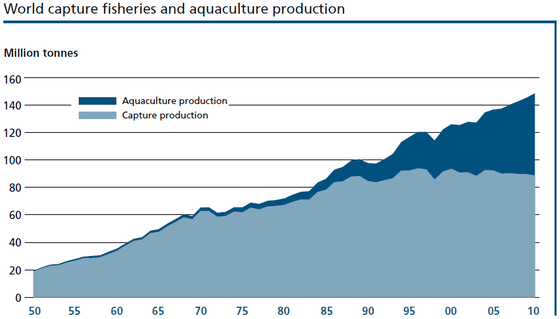The number of fish in the whole world is decreasing faster than expected

ByMaarit Lundbäck
Fisheries resources in the world are decreasing in number with the momentum far exceeding the former expectations. It is believed that there is an underexposure of the catch as a cause.
The World Is Running Out of Fish Faster Than We Thought | VICE | United States
http://www.vice.com/read/global-fish-stocks-are-in-even-worse-shape-than-we-thought
World fishery catch has increased several times in the 60 years from 1950 to 2010.2012 material of the United Nations Food and Agriculture Organization (FAO)According to 1950, the catch was 20 million tons, but it increased to 60 million tons in the 1970s. It is over 140 million tons in 2010. However, the increase since the 1980s is due to cultivation, catch of natural resources turned to decrease. In the graph below, the thin part of color shows natural catch, the thick part shows catch of cultured thing.

The peak catch of natural fishery resources is 86 million tons in 1996. However, it is the researcher at the University of British Columbia that points out that this figure was due to "underestimation", actually it was 130 million tonsGlobal Atlas of Marine FisheriesIt is Mr. Daniel Paulie, author.
Mr. Paulie, sometimes referred to as "the most famous and most controversial marine biologist in the world," Mr. Paulie, with scientists from 273 countries, has investigated more than 4000 publications over ten years and gathered local experts and fisheries We interviewed concerned parties. As a result, I found out that there are many figures not counted in "catch amount". One example is "fishing as a food of life". For example, Canada has recorded catch in Arctic as 0, but in fact Inuit is fishing for living. The amount of catch is of course known, but there are also "disposal" and "poaching" in addition to this, so that the total catch is not limited to a small number.
Although such "difference" in the catch amount seems to be improving in recent years, on the other hand, the decrease in fisheries resources is also progressing due to the change in the marine environment due to the rise in the seawater temperature mainly in the tropical regions.
Mr. Pauly says, "The thing we need to do is increase the number so as not to catch the fish so much, as the number increases, we can get diversity to cope with environmental change."
By the way, in JapanCatchable amount (TAC)Set upManaging and preserving biological resourcesdoing. As an example, however, for tuna, Japan is the world's largest fishing country and consuming country,Pacific bluefin tuna designated as endangered speciesDespite the fact that it is decreasing as much,The net fleet wrapped around the spawning bluefin tunaThere is the present condition,Fisheries AgencyWhether resource management by truly properly is done is difficult.
Related Posts:







